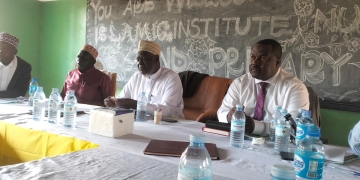
The Uganda People’s Defence Forces (UPDF) has seen a series of commanders who have been pivotal in shaping its trajectory since the National Resistance Army (NRA) transitioned into the UPDF following its victory in 1986. The position of Chief of Defence Forces (CDF), previously referred to as Army Commander, represents the apex of military leadership in Uganda. Below is an in-depth overview of the commanders who have steered the UPDF through its history.
Major General Mugisha Muntu (1989–1998)
Background: Mugisha Muntu was born in 1958 in Ntungamo District, Uganda. He was a prominent member of the National Resistance Army (NRA) during the Bush War (1981–1986) that brought President Yoweri Museveni to power.
Tenure: Muntu’s tenure as Army Commander began in 1989. He is widely credited with laying the groundwork for the professionalization of the UPDF by promoting discipline and instituting training reforms.
Post-Military Career: After leaving the army, Muntu joined politics, eventually becoming a founding leader of the Forum for Democratic Change (FDC), an opposition party in Uganda.
Lieutenant General Abubaker Jeje Odongo (1998–2001)
Background: Born in 1951 in Amuria District, Jeje Odongo rose through the ranks of the NRA during the liberation struggle. He played a vital role in key military operations during the 1980s.
Tenure: Odongo’s leadership focused on restructuring the army and dealing with the challenges of regional conflicts, including the Second Congo War. His tenure was marked by efforts to enhance military discipline and logistics.
Post-Military Career: Odongo transitioned into politics and has served as Uganda’s Minister of Foreign Affairs since 2021, among other roles.
Major General James Kazini (2001–2003)
Background: James Kazini was born in 1957 in Rukungiri District. Known for his operational expertise, he played key roles in military campaigns both domestically and regionally.
Tenure: His tenure as Army Commander coincided with Uganda’s contentious involvement in the Democratic Republic of Congo. Kazini’s leadership was marked by allegations of misconduct and financial improprieties.
Legacy: Kazini’s life ended tragically in 2009 when he was killed in a domestic dispute. Despite controversies, his contributions to Uganda’s military engagements remain notable.
General Aronda Nyakairima (2003–2013)
Background: Born in 1959 in Rukungiri District, Aronda Nyakairima was a disciplined and strategic officer. He joined the NRA during the Bush War and quickly rose through the ranks.
Tenure: Aronda’s decade-long leadership is credited with transforming the UPDF into a more professional and modern force. He led counterinsurgency operations against the Lord’s Resistance Army (LRA) and enhanced regional peacekeeping missions.
Post-Military Career: After serving as CDF, Aronda became Minister of Internal Affairs, a position he held until his sudden death in 2015.
General Edward Katumba Wamala (2013–2017)
Background: Born in 1956 in Mukono District, Katumba Wamala began his career in the Uganda Police Force before transitioning to the military. He is known for his calm demeanor and diplomatic leadership style.
Tenure: Katumba’s leadership focused on strengthening Uganda’s role in regional peacekeeping, particularly in Somalia under the African Union Mission in Somalia (AMISOM). He emphasized the importance of discipline and professionalism within the UPDF.
Post-Military Career: After his term as CDF, Katumba transitioned to politics and currently serves as Minister of Works and Transport.
General David Muhoozi (2017–2021)
Background: Born in 1965 in Mbarara District, David Muhoozi joined the NRA in 1985. He rose through the ranks due to his strategic acumen and leadership abilities.
Tenure: Muhoozi’s tenure was characterized by efforts to modernize the UPDF and enhance its regional influence. He prioritized peacekeeping missions and the acquisition of modern military equipment.
Post-Military Career: In 2021, Muhoozi was appointed State Minister for Internal Affairs.
General Wilson Mbadi (2021–2023)
Background: Born in 1962 in Kasese District, Wilson Mbadi joined the NRA in 1986. He served in several capacities, including as Aide-de-Camp to President Museveni and Joint Chief of Staff.
Tenure: Mbadi’s leadership emphasized strategic modernization and operational efficiency. His tenure ended in 2023, paving the way for new leadership.
General Muhoozi Kainerugaba (2023–Present)
Background: Born in 1974, Muhoozi Kainerugaba is the son of President Yoweri Museveni. He attended prestigious military academies, including Sandhurst in the UK and Fort Leavenworth in the US. Muhoozi has held various command positions within the UPDF, including the Special Forces Command (SFC).
Tenure: Appointed CDF in 2023, Muhoozi has focused on enhancing Uganda’s military preparedness and fostering regional security collaborations. His leadership is marked by an emphasis on modernization and countering emerging threats.
The UPDF’s leadership since 1986 reflects a journey of evolution, marked by professionalization, regional engagement, and modernization. Each commander has contributed uniquely to the institution’s legacy, ensuring that the UPDF remains a cornerstone of Uganda’s security and sovereignty. As the UPDF continues to adapt to new challenges, its leadership remains pivotal in shaping its future.










